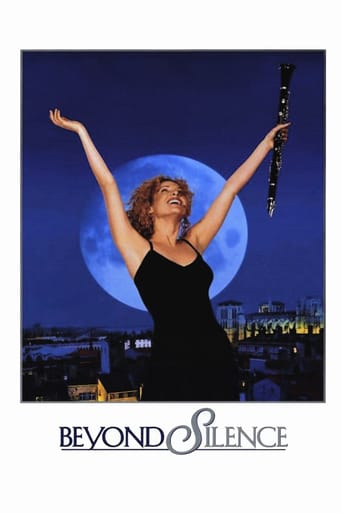MamaGravity
good back-story, and good acting
ShangLuda
Admirable film.
Doomtomylo
a film so unique, intoxicating and bizarre that it not only demands another viewing, but is also forgivable as a satirical comedy where the jokes eventually take the back seat.
Brenda
The plot isn't so bad, but the pace of storytelling is too slow which makes people bored. Certain moments are so obvious and unnecessary for the main plot. I would've fast-forwarded those moments if it was an online streaming. The ending looks like implying a sequel, not sure if this movie will get one
Lee Eisenberg
Young Lara is in a most unusual situation: her parents are both deaf-mute, so she has to communicate for both of them. It's sort of a constraining situation, and when a relative gives Lara the chance to become a musician, her parents try to keep her at home. She will have to choose.The idea of the daughter having to speak for her parents is not something that I ever would have thought about, but "Jenseits der Stille" (called "Beyond Silence" in English) made me think about it. It's always good to be able to see such intellectual stories, especially when Hollywood makes so many pointless blow-'em-up movies.
AnneBlythe104
I think this is a very neatly made movie. Although the focus of the movie itself is on Lara, the audience is also able to get to know each character's personality (e.g. Lara's parents, and her aunt and uncle). I personally found the reconciliation scene of Lara's Father and his sister very touching (though a bit too quick).This movie encourages people to go and search for their own ideals and ambitions, and at the same time let them know that despite every kind of fame and riches in the world, nothing can be more important and precious than the love from your own family. Very touching indeed.The music used in this movie is breath-taking as well. Alas that it doesn't have a soundtrack (or does it?).
da critic
Jenseits de Stille can be understood to belong to the genre of films known as social milieu films, or, in Germany, 'problem films'. These films function as explorations of certain specific cultures or classes and the intricacies and contradictions therein. For example, a social milieu film might examine working class life as such, and in tandem with other films of the sort, could create an overall filmic representation of the strife of working class existence. In the case of Jenseits der Stille, the milieu that is examined is the Deaf world, specifically in Germany. By following the coming of age of Lara, a hearing child of Deaf parents, we are led through one woman's experiences with and in the Deaf world. That the film is also a touching story of family relations and can be seen as a drama, a family movie, etc. does not exclude it from also functioning in this realm of 'problem film.' Rather, it can be seen to convey information and insight into a broader concept or community through the experiences and insights of one individual. Lara is constructed as a conflicted character even before she receives the fateful clarinet. As the hearing daughter of Deaf parents, she is often placed in interpreting situations, and expected to relay messages that surpass her scope as child. Instances such as her father's colleague's implication that she tell him of the non-existent Christmas bonus or her role as interpreter at the bank quickly convey the ways in which she is forced to grow old before her time. She must live in an adult's world and negotiate that world despite her age. Her parents are characterized as somewhat aloof of the demands that they make on her, and her own isolation is foregrounded. It is only when her aunt fosters her musical interest that Lara begins to find a sense of herself. These feelings of isolation, difficult communication and difference are expressed mainly through Lara, although her parents and extended family exhibit them as well. This film presents a great deal of verifiable information about the Deaf community through Lara and her family. Many Deaf couples give birth to hearing children, and conversely, the majority of Deaf people are born to hearing parents. The Christmas dinner and Martin's painful memories emphasize this occurrence. In this way, without the film being didactic or expository in its conveyance of Deafness, hearing viewers are still educated as viewers about the very real situations that many Deaf families must negotiate. Obviously the lexical difference of spoken and signed languages plays a large role in the film as well. This difference becomes important within the film as hearing viewers are attuned to different ways of seeing. Within the medium of film this is often the goal of filmmakers, to create new ways of viewing, of reading images. When this already visual medium is then used to explore yet another visual medium, the Deaf world, many doors are opened. An example of this is the intimacy between Kai and Martin, evident when they lie in bed together and Martin uses Kai's chest for his signing. A similar scene occurs in Children of a Lesser God as well, and both work to convey the shared space. A different level of intimacy is expressed, because the viewer then considers the act of communication through the body rather than just the mouth. Once this is understood, all movement on the screen has the potential to create atmosphere and convey information that far surpasses what a hearing viewer might normally require of a film. Ultimately this film engages with the social milieu of Deaf communities through both presentation and representation. That is, Deafness is represented and explored diegetically, while the medium of the film itself also serves to further explore that realm. Thus, Jenseits der Stille also functions to instrumentalize Deafness for the means of understanding image. This is perhaps a pairing of subject and medium that simply cannot be overlooked.
taproot
Entertaining film about a young girl whose parents are mute and depend upon her to communicate to the speaking world for them. Her aunt, a free-spirited musician, teaches her to play the clarinet, but the parents object. The young girl matures into a young woman whose musical abilities and desires become paramount. Her dependent parents attempt to keep her home and away from her chosen vocation. Well acted and a good drama. Large, yellow subtitles.

